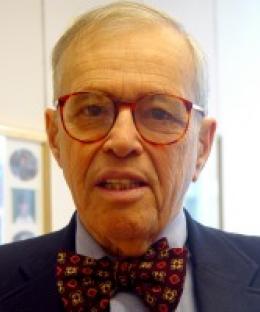

Louis Lowenstein, LL.B.’53, an eminent scholar, professor, and philanthropist who began his illustrious career as a corporate lawyer in New York and became one of the country’s most influential critics of financial misconduct on Wall Street, died on April 18, 2009, in New York at age 83 from pancreatic cancer.
The Simon H. Rifkind Professor Emeritus of Finance and Law at Columbia Law School, Lowenstein was a superb teacher and scholar, a leading expert on corporate governance, and an ardent believer in public service. Lowenstein earned his B.S. from Columbia Business School in 1947 and his LL.B. from Columbia Law School in 1953. After graduation, he clerked for Judge Stanley H. Fuld of the New York Court of Appeals. He returned to his alma mater in 1976 as a lecturer-in-law and in 1980 joined the Columbia Law School faculty.
"Lou was the gold standard, a truly magnificent colleague and friend," said David M. Schizer, Dean and the Lucy G. Moses Professor of Law, in an email to the Columbia Law School community. "We will miss his wisdom, insight, decency, and compassion."
Lowenstein was a highly influential scholar and teacher who mentored generations of Law School students, both as a beloved professor and also as chairman of the board of directors of the Columbia Law Review. His Law Review experience began in the early 1950s, when he was editor-in-chief of the publication. He taught courses on corporations, corporate finance, and accounting.
In 1998, Lowenstein, along with his wife Helen, pioneered and endowed a fellowship program at the Law School to encourage and reward students who demonstrated exceptional dedication and potential for making a substantial contribution to public interest law. The generous Lowenstein Fellowship program has provided financial assistance to more than 35 outstanding students. Fellows are selected by a committee of faculty, administrators, and graduates who are committed to helping students build a career in public interest law.
News of the professor's death prompted an outpouring of expressions of gratitude and admiration for Lowenstein from fellowship recipients: “Professor Lowenstein’s support has been, without exaggeration, life-changing,” said Darin Dalmat ’06, now an attorney at James & Hoffman, a small union-side law firm in Washington, D.C. “At every step of my career, it has afforded me the freedom to make choices that have allowed me to delve deeply into the labor movement without financial constraints.”
Myrna Pérez ’03, a voting rights attorney at the Brennan Center for Justice, noted that the fellowship “freed me up to do work I felt was meaningful and important.” Pérez added, “Professor Lowenstein was an incredibly decent, thoughtful, and caring person. He was generous with his insight, his support, and his affirmation. His loss will be a big one not only to the Columbia community but to the world of public interest law.”
Lowenstein made public service an integral part of his legal career. He was Chairman of the Coalition for the Homeless, and his commitment to the cause led to a seminar on that topic at the Law School, as well as other programs within the University. In addition, he was chairman of the Jewish Board of Family and Children Services.
Prior to teaching at Columbia Law School, Lowenstein practiced law in New York for more than two decades, specializing in corporate and securities transactions. He was a founding partner of Kramer Levin Naftalis & Frankel LLP, where from 1968 until 1978 he led the firm’s corporate department and provided counsel to a diverse range of clients. According to a tribute written by the firm, “Lou was a brilliant legal strategist, deep thinker and a consummate professional. He was a noble character and inspirational figure whose legacy continues to guide our law firm.” He left private practice to accept the challenge of running Supermarkets General Corporation, a NYSE company.
As part of his distinguished public service career, Lowenstein served on the O'Malley Panel on Audit Effectiveness, which dealt with auditor independence and related issues growing out of concern over the rise in various financial reporting abuses. In 2004 New York State Governor George E. Pataki ’70 appointed him to the Public Authority Governance Advisory Committee.
Lowenstein lectured and published extensively on corporate governance, markets, and financial markets. His opinion pieces appeared in Fortune, The New York Times, Washington Post, Wall Street Journal, Barron's, and the Harvard Business Review, among other publications, as well as in academic journals. Admirers of his work said the attention and criticism he attracted were signs of his outsize influence.
His four books on these subjects include Knights, Raiders, and Targets: The Impact of the Hostile Takeover (coed. and contributor, Oxford University Press, 1988); What's Wrong with Wall Street: Short Term Gain and the Absentee Shareholder (Addison-Wesley, 1988); Sense and Nonsense in Corporate Finance (Addison Wesley Publishing Company, 1991); and most recently, The Investor's Dilemma: How Mutual Funds are Betraying Your Trust and What To Do About It (Wiley, 2008). In a review of The Investor’s Dilemma, which describes a financial scandal in the mutual funds industry, The New York Times called Lowenstein “a heck of an investigative reporter, as well as an astute financial advisor.”